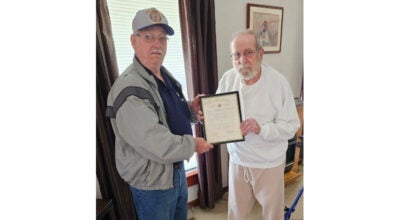Incumbent alleges opponent broke election law
Published 12:55 pm Saturday, March 17, 2018
FRANKLIN
Concerns regarding a possible violation of state election law on the part of Ward 3 city council candidate Andrea Hall-Leonard have been brought to the attention of the Franklin City Electoral Board. Hall-Leonard’s opponent in the May election, incumbent Councilman Greg McLemore, has alleged that Hall-Leonard had a friend collect the 50 signatures of qualified Ward 3 voters she needed to qualify to get her name on the ballot, but signed the affidavit beneath her petition for office as though she had collected the signatures herself.
According to City Registrar Jennifer Maynard, having a friend or campaign worker to go door to door to obtain petition signatures on a candidate’s behalf is perfectly legal and common. However, there is an affidavit at the bottom of the petition document, which Maynard confirmed that the person who collected the signatures, not the candidate him or herself, must sign.
The affidavit reads, “I, ______, swear or affirm that (i) my full residential address is ______ in the state/commonwealth of ______; in the county/city/town of ______; (ii) I am a legal resident of the United States of America; (iii) I am not a minor; (iv) I am not a felon whose voting rights have not been restored; and (v) I witnessed the signature of each person who signed this page or its reverse side. I understand that falsely signing this affidavit is a felony punishable by a maximum fine of up to $2,500 and/or imprisonment up to 10 years.”
As evidence to support his claims of wrongdoing, McLemore produced a copy of Hall-Leonard’s signed petition for office, which she indeed signed as “A. Hall-Leonard,” as well as a letter from Ward 3 resident Julia Boyd dated March 9, 2018. The letter reads:
“I was approached by a short dark-skinned lady asking me to sign a petition on behalf of her friend running for city council to help with our electric bills. I signed the petition in the presence of that lady not the candidate A. Hall Leonard. The candidate A. Hall Leonard never came to my house to witness my signiture (sic.) This is the truth the whole truth, so help me God. No one has promised me anything to come forward and share this statement and the below witnesses were present for me and to sign this statement.”
The letter is signed by four people: Julia Boyd, Greg McLemore, Barbara Dixon, who identifies herself as Boyd’s sister, and Julia Dixon, who identifies herself as Boyd’s niece.
Electoral Board Chairman Pat Newman said at the board meeting, which occurred on Tuesday at 4:30 p.m. in the city registrar’s office building, that after speaking with the city attorney and reviewing state election law, he felt that the board’s only recourse was to elevate the matter to Franklin-Southampton Commonwealth Attorney’s Office.
“We have no standing to make a decision about this,” Newman said. “We do not have investigation authority, we do not have the authority to remove anyone’s name from the ballot. The ballots have already been ordered.”
To justify his stance on the electoral board’s lack of authority, Newman cited state code 24.2-1019, which states that “any complaint or allegation concerning unlawful conduct under this title shall be filed with the attorney for the Commonwealth of the county or city in which the alleged violation occurred. In the case of a complaint or allegation concerning the filing of a false statement in a voter registration application, the violation shall be deemed to have occurred in the county or city where the applicant sought to be registered.”
Maynard confirmed that she felt the board and registrar’s office were taking the proper steps given that the allegation occurred after the March 6 filing deadline.
“There’s due process,” she said. “The board cannot remove her [Hall-Leonard’s] name from the ballot simply over an allegation.”
Speaking to The Tidewater News following the meeting, McLemore said he disagreed with Newman’s assertion that the commonwealth attorney was the correct office to deal with this allegation, and suggested that the State Department of Elections could take action under state code 24.2-612.1. That code reads “in the case of the death, withdrawal, or disqualification of any candidate, other than a party nominee, who has qualified to have his name printed on the ballot for any election other than a presidential or primary election, the Department of Elections shall take into account the time available before the election and the status of the ballots for the election and shall have authority to direct the electoral boards on how to proceed to print the ballot without the candidate’s name, correct the ballot to delete the candidate’s name, or provide notice to voters of the death, withdrawal, or disqualification of the candidate. If ballots are not corrected to delete the candidate’s name, the general registrar shall provide a list of candidates who have withdrawn to be posted in each polling place and to be available to the public. If election information is posted on the official website for the county or city, notice of the candidate’s withdrawal shall also be posted on that website.”
“I personally would have preferred that the candidate had just withdrawn from the race without turning [the matter] over to the commonwealth attorney, now the commonwealth attorney is obligated to go by the law,” McLemore said. “If you falsely sign [the affidavit], you’re committing a felony. In my opinion, the candidate should be disqualified from the ballot.”
However, Maynard said that state code 24.2-612.1 would only apply if a candidate had died, voluntarily withdrawn or had already been disqualified. She then provided The Tidewater News with a copy of the electoral board’s list of responsibilities and pointed out that the disqualification of candidates does not appear on this list.
The letter
The Tidewater News spoke to Boyd on Thursday regarding her letter, which makes no mention of who signed the affidavit on the petition and merely states that Hall-Leonard was not the person who came to her door to collect her signature.
Boyd confirmed that a short woman with gray hair, dark skin and glasses was the one who approached her with Hall-Leonard’s petition and witnessed Boyd’s signature. She said she agreed to sign the petition after asking the woman if Hall-Leonard would work to resolve the city’s current light bill issue and receiving an affirmative response.
A few days later, Boyd said she approached McLemore as he was passing through her street and asked him if he was working to resolve the city’s light bill issue.
“I’ll vote for whoever’s going to help the people [with their light bills],” she said.
When McLemore answered that he was working on it, she said she asked to sign his petition to run for office but was told by McLemore that since he was the incumbent candidate he did not have a petition for her to sign. It was then that she said she told him about the woman who approached her collecting signatures for Hall-Leonard.
McLemore then told her that what Hall-Leonard was doing was illegal, Boyd said, though she confirmed that McLemore never mentioned the word “affidavit” when describing exactly what he believed to be illegal. She also said that McLemore was the one who actually wrote the letter she signed.
“He brought it to me to sign,” Boyd said.
This is why he was in her presence when she signed the letter and why his signature appears directly below hers, she explained.
Maynard also confirmed that it was McLemore, not Boyd, who delivered the letter to her.
An illegal meeting
Hall-Leonard made no comments regarding any alleged wrongdoing concerning her petition for office but did raise concerns over the legality of a conversation between two members of the electoral board and McLemore that occurred approximately half an hour after the regular scheduled meeting of the electoral board had adjourned.
The conversation involved electoral board secretary Gwen Blue, vice chairwoman Devita Fenner, McLemore and Antonio Parham, who is the vice chairman of the Franklin City Democratic Committee.
Blue had not been present for the regular scheduled meeting, arriving late to the Registrar’s Office. McLemore explained that his purpose in speaking with Blue, whom he said was the FCDC’s appointee to the board, was to inform her as to what had been discussed at the meeting in her absence.
Blue confirmed to The Tidewater News on Thursday that Hall-Leonard had expressed concerns that since two of the three electoral board members were present for this conversation, it constituted a meeting on the grounds that there was a quorum. Blue said she agreed with Hall-Leonard that the conversation could constitute an unannounced special meeting, apologized to the candidate, and then left the building.
City Attorney H. Taylor Williams IV explained that an unannounced gathering of two or more members of the electoral board during which electoral board matters were discussed would constitute a violation of Virginia’s Freedom of Information Act.
He referenced Virginia Code 2.2-3701, which defines a meeting as “a body or entity, or as an informal assemblage of (i) as many as three members or (ii) a quorum, if less than three, of the constituent membership, wherever held, with or without minutes being taken, whether or not votes are cast, of any public body,” and Virginia Code 2.2-3707 section C, which states “every public body shall give notice of the date, time and location of its meetings by (1) posting such notice on its official public government website if any, (2) placing such notice in a prominent public location at which notices are regularly posted and (3) placing such notice at the office of the clerk of the public body or, in the case of a public body that has no clerk, at the office of the chief administrator… The notice shall be posted at least three working days prior to the meeting.”
“Unfortunately for the electoral board, because they’re such a small body, two or more members can’t get together because they constitute a quorum,” he said. “Whereas if two members of city council got together, because of the size of the body, that’s not an illegal meeting.”





